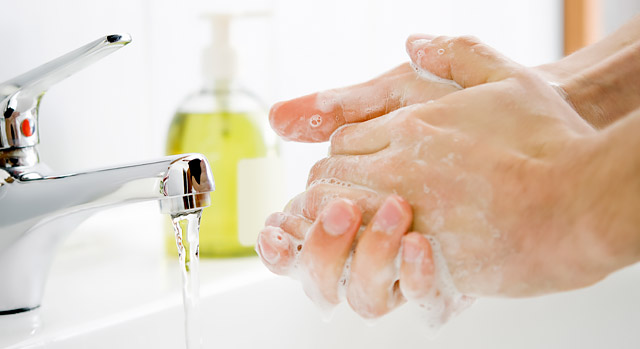Prevent Infections with Handwashing
Handwashing is the single most important factor to prevent the spread of infections. The simple act of washing your hands can help keep you and those around you from getting sick at home, at work and at the hospital. Handwashing with soap and running water removes the germs you cannot see but may have picked up from:
- Contaminated surfaces
- Other people
- Animals
- Waste
At Lakewood Ranch Medical Center, we want to safeguard patients and visitors from infectious diseases caused by germs. Whether you see them or not, germs hide just about anywhere. When our hands come in contact with them, we can become carriers of disease, not only infecting ourselves but spreading infections to others. Contaminated hands can spread mild illnesses such as the common cold, to more serious diseases, such as hepatitis A and meningitis.
Unfortunately, there are still people who do not remember to wash their hands in certain scenarios. Do your part in preventing the spread of disease and follow the guide below to properly wash your hands.
How to Wash Your Hands the Right Way
Always make sure you’re washing your hands thoroughly to remove all germs.
- Use warm water to wet your hands and apply soap.
- Rub your hands together vigorously, scrubbing the entire surface. Remember to get between your fingers and under your nails. Do this for a minimum of 20 seconds, as rubbing dislodges the germs from your hands.
- Rinse well and use a towel to turn off the faucet.
- Finally, dry your hands.
It’s likely that you’re not washing your hands as often as you should. When your hands become contaminated, you can infect yourself whenever you touch your nose, mouth or eyes, or you can spread diseases when you come into contact with food or other people. There are several occasions when you absolutely need to wash your hands to avoid infection:
- Before, during and after you prepare food
- Before you eat
- After going to the bathroom
- Before and after treating a cut or wound
- After sneezing, coughing or blowing your nose
- After handling animals
- When your hands are visibly dirty or after touching garbage
- After coming in contact with someone who is already sick
By washing your hands frequently and using the proper techniques, you can effectively prevent the transfer of germs and the spread of diseases.

